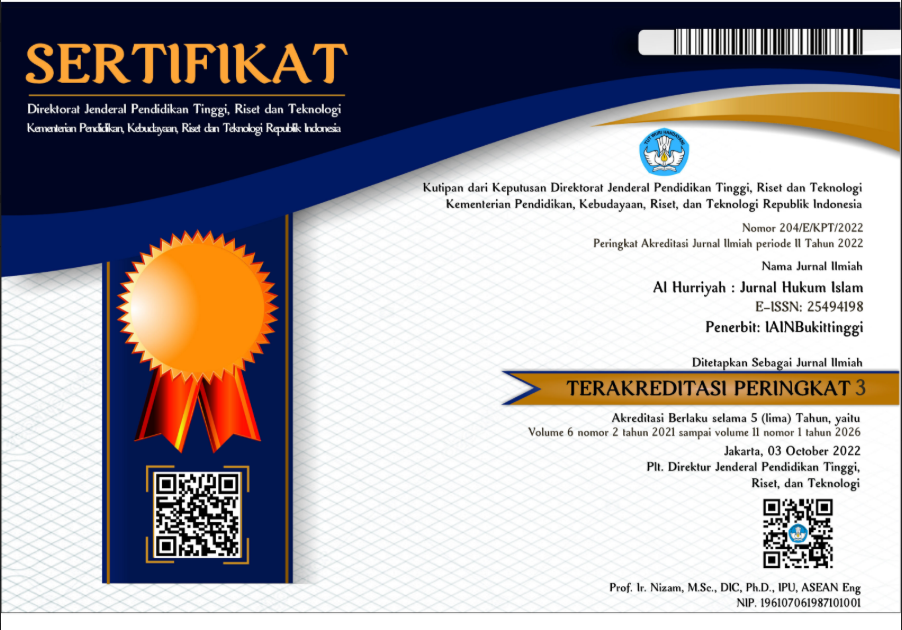ZAKAT SEBAGAI INSTRUMEN JAMINAN SOSIAL MODEREN: ALTERNATIF STRATEGIK
DOI:
https://doi.org/10.30983/alhurriyah.v2i1.260Abstract
References
Abu Dawud, Sunan AbÄ« DÄwud, Kitab: Zakah, Bab: Man yu’ta min al-sadaqah.
Aghnides, (1961). Mohammedan theories of finance, Lahore: Premer Book House.
al-cAni, (1999), MasÄrif al-zakÄt wa tamlikÅ«hÄ fÄ« daw’i al-KitÄb wa al-Sunnah, cAmman: DÄr Usamah
al-BÄjÅ«rÄ«, HÄshiah al-BÄjÅ«rÄ« calÄ ibn QÄsim al-GhazÄ«, Bandung: Maktabah Dahlan.
al-Bukhari, Sahih al-Bukhari, Kitab Zakah, Bab Wujub al-zakah.
al-DasÅ«qÄ«, HÄshiyah al-DasÅ«qÄ« calÄ Sharh al-kabÄ«r, cĪsÄ al-BÄbÄ« al-HalabÄ«, Kairo.
al-SÄ«rÄzÄ«, (1994), al-Muhazzab fÄ« Fiqh Mazhab al-ImÄm al-SyaficÄ«, Beirut: DÄr al-fikr.
al-TabranÄ«, (1985), Mucjam al-ausÄt, Kairo: Maktabah al-MacÄrif.
al-QaradawÄ«, Yusuf, (2001), Fiqh al-zakÄh: DirÄsah muqÄranah li ahkÄmihÄ wa falsafatihÄ fÄ« dau’ Alquran wa al-Sunnah, Beirut, Muassasah al-RisÄlah.
al-QurtubÄ«, Muhammad bin Ahmad al-ansarÄ«, Tafsir al-QurtubÄ«, Beirut: DÄr al-Fikr.
Billah, Ma’shum, (2003), Islamic law of trade and finance, Selangor: Ilmiah Publishers.
Burj, (2004), Al-AhkÄm al-zakÄh al-Tharwah al-zirÄᶜiyah wa al-hayyawÄniyah, Iskandariyah: DÄr al-JÄmiᶜah al-JadÄ«dah.
Dixon, (1999), Social security in global perspective, London: Praeger Publisher.
Do’i, (1990), Non-Muslim Under the Shari’ah, Kuala Lumpur: A.S. Noordeen.
GhÄzÄ« cInÄyah, (1991), al-UsÅ«l al-cammah lil iqtisÄd al-IslÄmÄ«, Beirut: DÄr al-Jail.
Ibn cÄ€bidÄ«n, (1992), Radd al-muhtar calÄ al-dÄr al-mukhtÄr, Beirut: DÄr al-Kutub al-cIlmiyyah.
Ibn KathÄ«r, (2002), TafsÄ«r Alquran al-cazÄ«m, Arab Saudi: DÄr Taibah.
Ibn ManzÅ«r, LisÄn al-carab, Kairo: DÄr al-Misriyah Litta’lif wa al-Tarjumah.
Ibnu Qudamah, (1969), al-Mughnī fī al-fiqh al-Hanbalī, Kairo: Maktabah al-Qahirah.
Majmac al-Lughah al-cArabiyah, (2004), Mucjam al-wasīt, Kairo: Maktabah al-Shurūq al-Dauliyah.
Ramadhan, Thariq, (2003), Menjadi modern bersama Islam: Islam, barat dan tantangan modernitas. Jakarta: Teraju.
Tarimin, Mujaini, (2004), Zakat menuju pengurusan profesional, Selangor: Pusat Zakat Selangor.
Wilson, Thomas & Dorothy, (1991), The State and social welfare, London: Longman.
Published
How to Cite
Issue
Section
Citation Check
License
Authors who publish with this journal agree to the following terms:
- Authors retain copyright and grant the journal right of first publication with the work simultaneously licensed under a Creative Commons Attribution-ShareAlike 4.0 International License that allows others to share the work with an acknowledgment of the work's authorship and initial publication in this journal.
- Authors are able to enter into separate, additional contractual arrangements for the non-exclusive distribution of the journal's published version of the work (e.g., post it to an institutional repository or publish it in a book), with an acknowledgment of its initial publication in this journal.
- Authors are permitted and encouraged to post their work online (e.g., in institutional repositories or on their website) prior to and during the submission process, as it can lead to productive exchanges, as well as earlier and greater citation of published work (See The Effect of Open Access).





